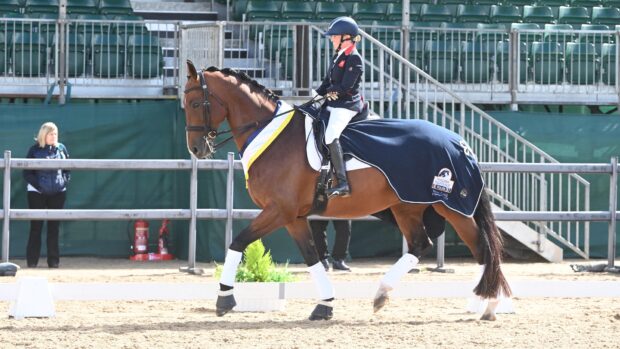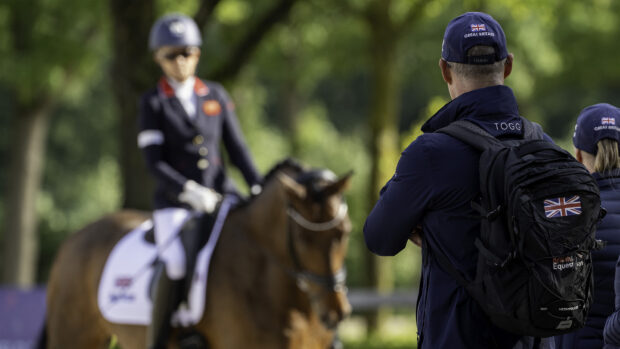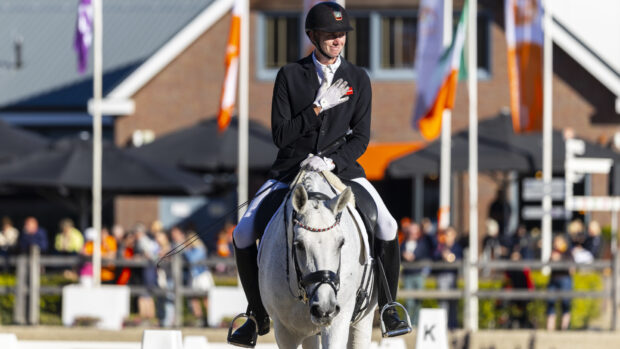Pammy Hutton shares her views on why the para dressage grading system needs to change and her concerns about needle-happy vets
Para dressage riders are facing a challenging dilemma. Their crucial grading happens either via a classification evaluation or at a show – and riders must compete in their allocated grade as soon as it appears on the FEI master list.
If a rider is regraded at a competition, they can choose to compete in their new grade or in the entered grade. However, where the entered grade is lower, riders are penalised with a 10% reduction in each test’s score. Alternatively, riders can choose to ride in their new grade, with a commander for that event only and not at championships.
Should para riders really be expected to go to an international show knowing six tests like the back of their hand, just in case? Surely videos could decide their grade in advance?
When our one-armed rider went to Wellington to compete, he was immediately downgraded to level 3. But this should have happened well beforehand to save the judges from learning on the day that cantering is a step too far. It also begs the question of culpability should an accident happen.
Having suffered a stroke at age seven, with supporting evidence, only now can he compete at the right grade for him. He could have changed grades at the competition. But how anyone learns all those tests – let alone someone who’s had a stroke – is beyond me. This grading method needs upgrading.
On a happier note, and in a victory for inclusivity, para riders are now able to sit exams for British Horse Society teaching qualifications. My late mother Molly Sivewright, who set up Talland, now the oldest family-run Riding for the Disabled Association centre in the UK, would have been delighted. Not least because we have been campaigning for this for three decades. Our para rider has now passed Stage 2 Coaching and is taking his Stage 3 Coaching at the end of the year.
Strip away the sparkle
“Dressage should not resemble a circus show” read a recent H&H headline regarding a proposal to allow glitter on horses. Quite so, even horses clipped out in patterns make me wince. Our equine partners are horses, not fashion accessories. It’s what’s to be found underneath, what my friend in the north calls the “top show”, that counts.
Getting my winter fix of Strictly Come Dancing, I was struck by how much of the judges’ advice can be applied to dressage, once you strip away the sparkle. I wonder how many hours the dancers spend improving their posture and perfecting their routines. I’ve tried to set a bit of an example with “No stirrups November”.
The Strictly judges also remind competitors to breathe, and specifically when to exhale to relax. Yes, it works.
They also point out that it’s all brilliant to look theatrical, play the character and have the poshest frock – but that you also need the correct footwork, posture, frame and core strength.
And one final Strictly judges’ tip for all of us dressage riders: “Don’t let the nerves spoil it. Go out there, own the dance floor and enjoy!”
Onwards and upwards
I’m often asked about hacking for dressage horses and, yes, we hack ours. Is it good for them? Mentally, for sure, but on today’s roads it can be risky and we never trot on the tarmac.
The jury’s out about roadwork, and whether it helps or hinders, but there’s already too much indiscriminate medicating of joints going on. Admittedly, many horses nowadays are so big-moving that they can be hard to keep sound. But equally, some vets are needle-happy, with insurance companies reporting many payouts.
By the way, I wish records of all veterinary goings-on were kept with horses’ passports for all to see.
And finally, watching Carl’s wonderful grand prix test with En Vogue at the Nationals, I was intrigued to note he was holding the reins between his thumbs and first fingers. So, I asked him why.
“It helps upwardness,” he said. Upwards we go!
● Are you a para rider who has been affected by regrading? Let us know at hhletters@futurenet.com, including your name, nearest town and county, for the chance to have your thoughts published in a future edition of Horse & Hound magazine
- This exclusive column will also be available to read in Horse & Hound magazine, on sale Thursday 7 December, 2023
You may also be interested in…

New dressage tests and rules revealed: what riders need to know

‘Breaking down barriers’ as dark breeches to be allowed in competition

Horse & Hound’s helpful guide to becoming a dressage judge

Subscribe to Horse & Hound magazine today – and enjoy unlimited website access all year round
Horse & Hound magazine, out every Thursday, is packed with all the latest news and reports, as well as interviews, specials, nostalgia, vet and training advice. Find how you can enjoy the magazine delivered to your door every week, plus options to upgrade your subscription to access our online service that brings you breaking news and reports as well as other benefits.




